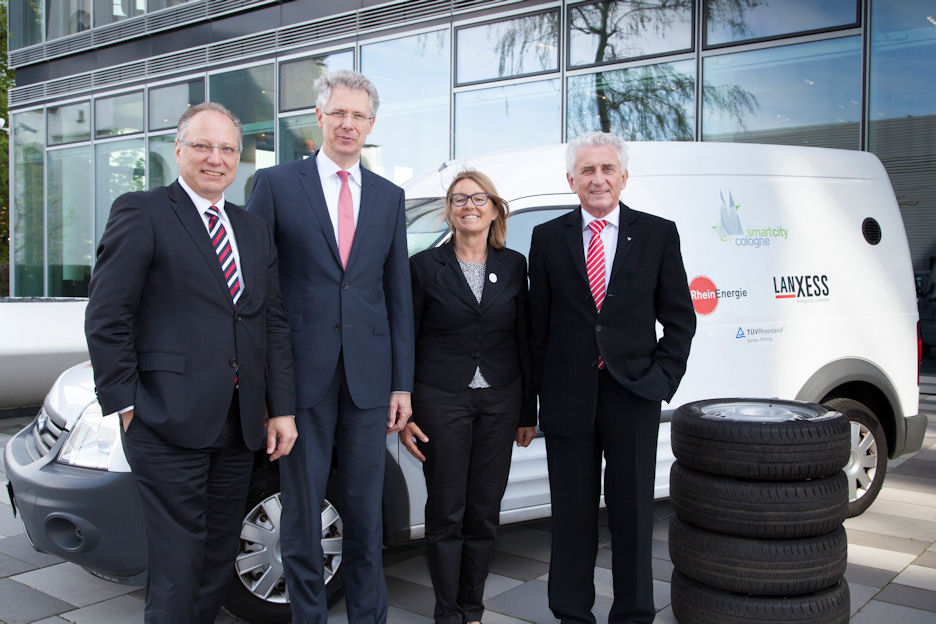On-road test: Fuel efficient tyres make ‘economic and environmental sense’
 (l to r): Norbert Graefrath (RheinEnergie), Rainier van Roessel (Lanxess), Barbara Möhlendick (City of Cologne climate protection coordinator) and Jürgen Braukmann (TÜV Rheinland). Photo: Lanxess AG
(l to r): Norbert Graefrath (RheinEnergie), Rainier van Roessel (Lanxess), Barbara Möhlendick (City of Cologne climate protection coordinator) and Jürgen Braukmann (TÜV Rheinland). Photo: Lanxess AG
The average difference in fuel consumption gained by fitting tyres with a ‘B’ EU tyre label fuel efficiency rating instead of ‘F’ rated tyres is around 4.1 per cent, suggests a test carried out in Germany. The six-vehicle test was jointly conducted by Chemical manufacturer Lanxess and energy provider RheinEnergie as part of a project run together by RheinEnergy and the City of Cologne over the last few years.
Over a six-month period, the fuel consumption of half a dozen RheinEnergie vans was measured as they went about their daily business in Cologne and surrounding areas. Three of the otherwise identical vans were fitted with ‘B’ label tyres and the other three with ‘F’ rated tyres, and halfway through the test each group changed over to the other class of tyre. Approximately 37,000 kilometres (23,000 miles) was covered by the six vans in total during the trial.
Lanxess reports the results show a maximum fuel saving of 6.96 per cent and drop in CO2 emissions of up to 155 kilogrammes per 10,000 kilometres. These results were independently monitored and verified by TÜV Rheinland. “The long-term test monitored by TÜV Rheinland confirms that it makes economic and environmental sense to use ‘green tyres’ even on small vehicles used in urban traffic,” commented Jürgen Braukmann, member of the TÜV Rheinland Group Executive Council responsible for mobility.
Beefing the six-vehicle test results up to fit large fleet proportions, Lanxess’ calculations show that a fleet of 650 cars or vans (up to 3.5 tonnes) currently running on ‘F’ tyres could save as much as about £37,900 a year just by switching to ‘B’ rated tyres, assuming a distance of 8,700 miles per vehicle and a diesel price of £1.15 per litre. CO2 reductions would amount to almost 87 tonnes per year.
Based on the results of the six-vehicle test, RheinEnergie has decided to successively switch its fleet over to more fuel efficient tyres. The first step involves refitting around 130 vehicles when their worn tyres are due for replacement. Other vehicles will be refitted as soon as suitable tyres are available in the required sizes. “As an energy service provider and supplier we take our responsibility for the environment very seriously,” said RheinEnergie Executive Board member Norbert Graefrath. “We are delighted to find such an expedient and convenient way of making a contribution to environmental protection.” Already by refitting the first 130 vehicles it will be possible to cut CO2 emissions by a good 11 metric tons a year.”




Comments